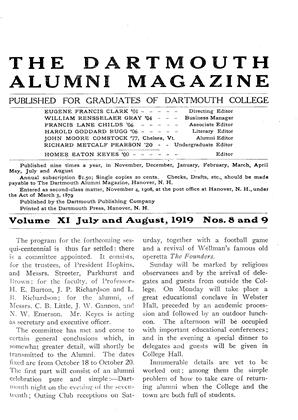Besides the new courses in the Classical Foundations of Modern Civilization, described elsewhere in the MAGAZINE, over a dozen others in various departments are to be offered for the first time next year.
One of the most interesting of these is the synoptic course in Mathematics, which is intended as a cultural course. This is to be a general survey of the science, with the purpose of developing understanding and insight into the nature of mathematical ideas and methods and an appreciation of their significance. This course will be taught by all the members of the department, each man presenting those topics with which he is especially familiar. At Cornell and the University of Chicago, where such a course has been tried, it has met with success.
Two other new courses in Mathematics are to be given. The Mathematics of Investment is a course covering various forms and applications of interest and discount, including annuities, sinking funds, capitalization, depreciation, valuation, of bonds, elementary theory of insurance, etc. It will be especially valuable to all men who intend to enter the Tuck School. Mathematics 14, the Teaching of Algebra and Geometry, is designed for those who expect to enter secondary school work. Among other topics it will include some history, the 'discussion of text-books, and of the methods of presenting the subject.
Three new courses in Psychology will be offered next year. Course 5 will be taught by Professor Moore and Dr. Gilliland. It is to be given entirely to the study of mental testing of individuals and groups, with special attention to the practical significance of subnormality, supernormality and special abilities and disabilities.
Psychology 6 is a course in experimental education offered by Dr. Gilliland in the second semester. It is a laboratory study of the problems of learning. An attempt to answer the practical problem of how to study is made by the exact measurement of progress in ordinary school subjects, beginning with the simple functions of read- ing and writing, and leading to the more complex problems of the curriculum.
Psychology 8, entitled Behaviour, is to be offered in the second semester by Mr, Stone, who returns from service in the army in September. It is an interpretation of mental life as a response to the three biological activities, nutrition, locomotion, and reproduction. Human motivation and mental efficiency are the central topics of consideration.
The changes in the History Department are aimed to devote more time to the recent period in history, and to show the background of the war and interpret the past in the light of the war. To this end the work in English History has been spread over three semesters. In this way an entire half year can be devoted to the nineteenth century. History 9, covering European diplomacy from 1870 to 1919, will treat the diplomatic crises from the Franco-Prussian War up to the present time. It will be taught by Professor Anderson, who has been on the ground in Paris as an expert on diplomatic history.
Types of Modern European Thought is the subject of the new course in Comparative Literature. It deals primarily with the history of modern thought as a vital force affecting lives and conduct. Philosophers, literary men, scientists, and any others who have affected modern-thought will be taken up along national lines, the first semester being devoted to England from Bacon to the present time, and the second to France and Germany from the Renaissance on.
A new course in Zoology aims at an explanation of the development of social instincts and an introduction to some of the elementary principles of Economics in the effect of environment on 'animals. The work will be largely in the form of lectures with demonstrations.
 View Full Issue
View Full Issue
More From This Issue
-
 Article
ArticleCOMMENCEMENT, 1919
July 1919 -
 Class Notes
Class NotesCLASS OF 1899
July 1919 By KENNETH BEAL -
 Article
ArticleREPORT OF THE TRUSTEES MEETING
July 1919 -
 Article
ArticleTHE COLLEGE: RETROSPECT AND OUTLOOK
July 1919 By Ernest Martin Hopkins -
 Article
ArticleA TWENTY-FIVE YEAR REUNION
July 1919 -
 Article
ArticleThe program for the forthcoming
July 1919
Article
-
 Article
ArticleFive Newly Elected Members Of Dartmouth Alumni Council
June 1950 -
 Article
Article50 Years of Climbing
NOVEMBER 1971 -
 Article
ArticlePolitics
Jan/Feb 1981 -
 Article
ArticleThe Fine Art of Renovation
July/August 2001 -
 Article
ArticleSkiing
February 1954 By CLIFF JORDAN '45 -
 Article
ArticleHOCKEY
January 1951 By Francis E. Merrill '26


